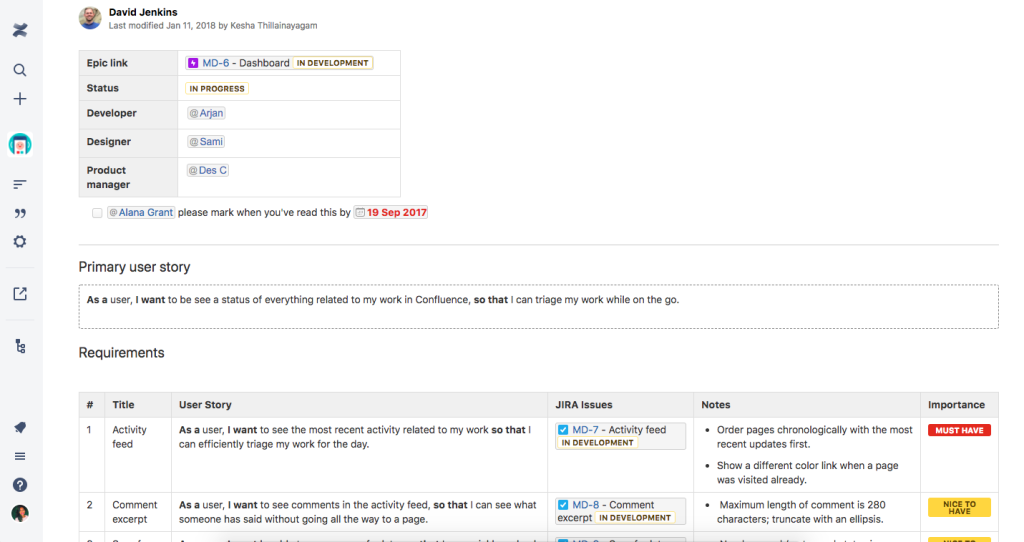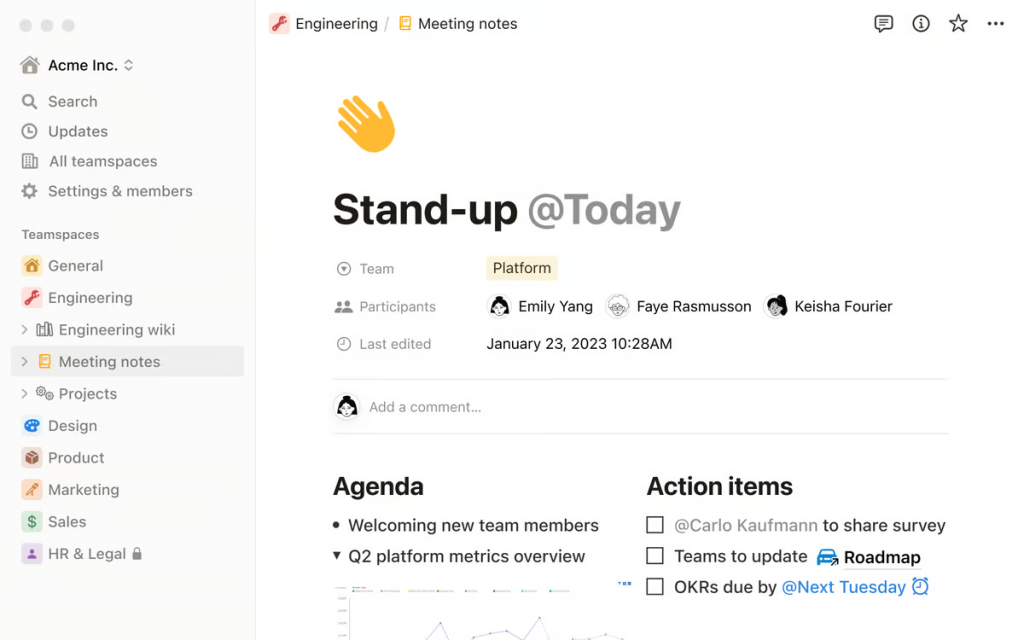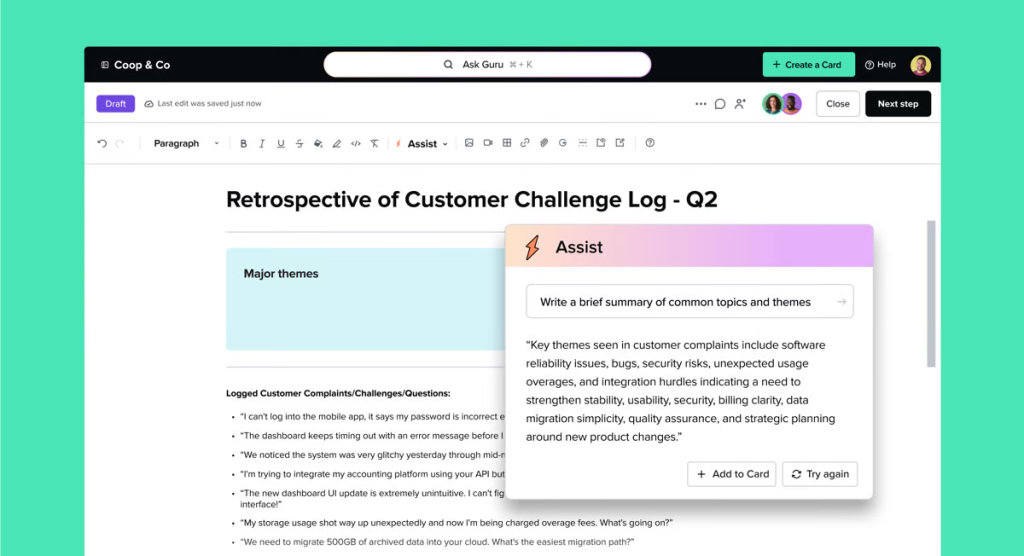
Have you ever had that lightbulb moment, only to forget the genius idea later? Or maybe a new team member spent days reinventing the wheel on a problem someone else already solved? That’s the knowledge-sharing struggle in a nutshell—and it’s not just frustrating; it’s costly for startups and growing businesses.
So, strap in and get ready to discover the 5 platforms that can transform how your team shares, learns and grows together. Your journey to startup success starts with unlocking the full potential of your collective brainpower.
How Knowledge-Sharing Works in a Startup Environment?
Your startup is a rocket ship fueled by caffeine, ambition, and a whole lot of raw talent. But what’s the one thing that can truly ignite that engine and propel you towards the stars?
Knowledge.
Not just any knowledge but the collective wisdom, insights, and experiences brewing within your team. But in the chaos of a startup, that knowledge often gets lost in the shuffle – scattered across emails, scribbled on sticky notes, or trapped inside the minds of your team members.
In a startup’s whirlwind, knowledge sharing is anything but a formal affair. It’s less about boardroom presentations and more about spontaneous sparks of insight that happen over a whiteboard or a late-night Slack exchange.
But while these informal interactions are essential, they’re not always enough to capture and preserve the wealth of knowledge being generated. That’s where those mission control centers we mentioned earlier – knowledge-sharing platforms – come into play. They provide the structure and organization needed to harness the power of those spontaneous moments and turn them into actionable insights that drive your startup forward.
Why Knowledge-Sharing is Important for Startup Teams?
When every decision and every minute counts, knowledge sharing isn’t just a nice-to-have; it’s a game-changer. It’s the fuel that propels your team towards innovation, efficiency, and, ultimately, success. Here’s why building effective knowledge-sharing processes is absolutely essential for startups in 2024:
- Turbocharged Productivity
Imagine a team where everyone is constantly reinventing the wheel, stumbling over the same problems, and wasting precious time searching for answers. A nightmare, right? Knowledge sharing breaks down these barriers, allowing your team to build on each other’s successes, avoid past mistakes, and find solutions faster.
- Decisions Powered by Insight
In a startup, decisions can make or break you. Knowledge sharing ensures that those decisions aren’t based on gut feelings alone but on a solid foundation of collective wisdom and experience. When everyone has access to relevant data, insights, and lessons learned, your team can make smarter, more strategic choices.
- Onboarding on Warp Speed
Bringing new hires up to speed can be a time-consuming process. But with a well-oiled knowledge-sharing system, they can quickly tap into your team’s collective brainpower, reducing the learning curve and accelerating their contributions.
- Igniting the Innovation Engine
Innovation isn’t just about having brilliant ideas; it’s about connecting those ideas and building on them. Knowledge sharing fosters a culture of collaboration and cross-pollination, where different perspectives collide, sparking new solutions and driving your startup to the cutting edge.
- A Team That Learns Together, Wins Together
Knowledge sharing is also about building a stronger team. When everyone feels heard, valued, and empowered to share their knowledge, it creates a sense of trust, camaraderie, and shared purpose that can propel your startup to new heights.
How Digital Tools Can Streamline Knowledge-Sharing
While those spontaneous knowledge exchanges are the heart and soul of a startup, let’s face it: they can be a bit messy. Brilliant ideas get lost in the shuffle, important documents vanish into the digital abyss, and new hires spend precious hours trying to track down basic information.
That’s where the unsung heroes of knowledge-sharing come in: digital tools.
Here’s how these tools can streamline and supercharge your team’s knowledge-sharing efforts:
- Centralized Hub: No more hunting through emails, Slack threads, or random documents. A central repository keeps all your knowledge organized and accessible in one place.
- Search and Discover: Powerful search features make finding the information you need easy, even if you don’t know exactly what you’re looking for.
- Collaborative Workspaces: Work together on documents, brainstorm ideas in real time, and get feedback from your team all in one place.
- Version Control and History: Track changes, revert to previous versions, and see how your knowledge has evolved over time.
- Integrations: Connect your knowledge-sharing platform with other tools your team already uses, like Slack, Google Drive, or project management software, for seamless workflows.
Tips for Choosing the Right Knowledge-Sharing App
When it comes to choosing the best knowledge app for your startup, you come to the realization that there are countless options out there, each with its own set of features. It can become quite hard to navigate!
- Know Your Needs
Before you start browsing, take a hard look at your team and workflow. What kind of information do you need to share? How do you typically collaborate? What tools are you already using? Understanding your unique needs and habits will help you narrow down the options.
- Prioritize Ease of Use
Let’s face it, your team doesn’t have time to learn a complex new tool. Look for platforms with intuitive interfaces and minimal learning curves. Remember, the goal is to make knowledge-sharing seamless, not add another layer of complexity.
- Embrace the Power of Search
Time is of the essence in a startup environment. Your chosen platform should have a robust search function that allows you to quickly find the information you need, whether it’s a document, a conversation, or an expert’s advice.
- Integrate, Don’t Isolate
Your knowledge-sharing platform shouldn’t exist in a vacuum. Look for options that integrate seamlessly with the other tools your team relies on, like Slack, Google Workspace, or your project management software. This will make it easier for everyone to adopt and use the platform in their daily workflows.
- Consider the Cost
Startups often have tight budgets, so choosing a platform that fits your financial constraints is important. Some platforms offer free plans with limited features, while others have tiered pricing based on your team size and needs. Don’t be afraid to start small and upgrade as your team grows.
The Most Important Features
When it comes to knowledge-sharing apps, some features are essential for any startup, while others might be nice-to-haves depending on your specific needs. Here’s what you should absolutely prioritize:
- Intuitive User Interface: Think of this as the “first impression” of your knowledge-sharing tool. If it’s clunky, confusing, or looks like it was designed in the 90s, your team won’t use it. Look for platforms with clean, modern designs and easy-to-understand navigation.
- Blazing-Fast Search: In a startup, time is everything. Your team shouldn’t have to waste precious minutes (or hours!) digging through endless folders or scrolling through Slack threads. A powerful search function that can quickly surface relevant documents, conversations, and expertise is an absolute must-have.
- Seamless Integration with Your Existing Tools: Your knowledge-sharing platform should be a team player, not a lone wolf. Make sure it integrates smoothly with the tools your team already uses every day, like Slack, Google Workspace, or your project management software. The less friction, the better.
- Collaboration Made Easy: Knowledge sharing is all about working together. Look for platforms that offer features like real-time editing, commenting, @mentions, and version history. This will make it easy for your team to collaborate on documents, brainstorm ideas, and give feedback in one centralized place.
- Customization Options: Every startup has its own unique way of working. Choose a platform that allows you to tailor it to your specific needs, whether it’s creating custom templates, organizing information in a way that makes sense for your team, or integrating with your existing processes.
By keeping these tips in mind, you’ll be well on your way to finding a knowledge-sharing platform that empowers your team, streamlines your workflow, and fuels your startup’s success.
Things You Should Look Out For
While the features listed above are essential, there are also some potential pitfalls you should watch out for when choosing a knowledge-sharing platform:
- Costly Upgrades: Some platforms offer enticing free plans but then charge hefty fees when you need to upgrade for more storage, features, or users. Make sure you understand the pricing structure upfront and factor in potential future costs as your team grows.
- Limited Scalability: Your startup is hopefully on a growth trajectory, so your knowledge-sharing platform should be able to scale with you. Avoid platforms that might become cumbersome or restrictive as your team expands or your knowledge base grows.
- Poor Customer Support: If you run into issues or have questions, you want to know that help is readily available. Research the platform’s customer support options and make sure they align with your expectations.
5 Best Knowledge-Sharing Platforms for Startups
Ready to take your startup’s knowledge sharing to the next level? Here are five best knowledge management platforms that cater specifically to the needs of growing teams like yours.
FuseBase

FuseBase is a team and client collaboration platform that seamlessly blends note-taking, wiki creation, and document collaboration. It is the ultimate knowledge hub for startups that crave organization and efficiency. FuseBase’s user-friendly design ensures that even the least tech-savvy team members can quickly navigate the platform. You can transform your company’s knowledge base into a vibrant knowledge center, complete with customizable pages, team directories, and company-wide announcements.
Confluence

Confluence’s deep integration with other Atlassian tools, such as Jira (for project management) and Bitbucket (for code repositories), makes it a natural choice for software development teams. It is the perfect tool for managing projects, tracking code changes, and documenting every step of the development process.
SharePoint

While primarily known as an enterprise solution, SharePoint’s flexibility makes it a viable option for growing startups with complex knowledge-sharing needs. Its robust document management, collaboration, and automation features can streamline your workflows and create a centralized hub for all your company’s information.
Notion

Whether you want to create a company wiki, manage projects, or simply jot down ideas, Notion’s flexibility is its superpower. It’s a one-stop shop for notes, wikis, project management, and even simple databases. You can customize it to fit your team’s unique workflows and create a knowledge base that truly feels like your own. It’s easy to jumpstart your knowledge base with pre-built templates for meeting notes, product roadmaps, and more.
Guru

Imagine having an AI-powered assistant that can answer your questions, provide relevant information, and even suggest knowledge gaps you might not be aware of. That’s Guru. Guru combines a knowledge base with an AI-powered assistant that lives in your browser and seamlessly integrates with your team’s workflow, providing knowledge exactly when and where you need it.
Conclusion
Remember, there’s no one-size-fits-all solution. The best knowledge-sharing platform for your startup depends on your unique needs, workflow, and budget. Take advantage of free trials, explore demos, and don’t be afraid to experiment. The right platform can transform your startup into a knowledge-sharing powerhouse, empowering your team to achieve more than you ever thought possible.
